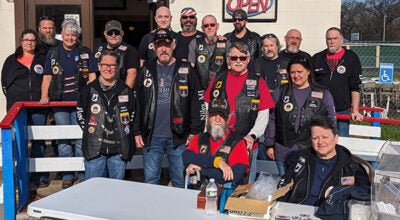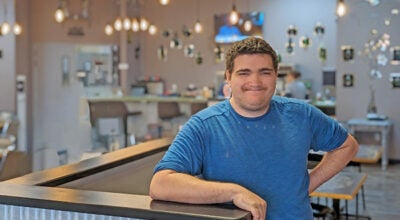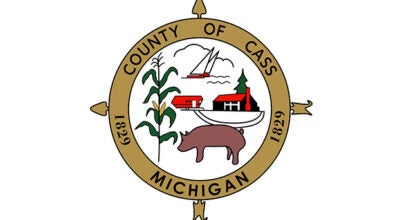‘The problem isn’t skin’
Published 10:34 pm Monday, January 17, 2011

Clergy leading the march Sunday afternoon from City Hall to Second Baptist Church for the 25th Martin Luther King Day, include, from left: Tyrone Pace; Al Smith; Justin Shepard, president of ACTION Ministry, All Churches Together in One Network; Tracy Roddy; and John Kasper. (The Daily News/John Eby)
Sunday’s 25th Dr. Martin Luther King Day memorial march went with police escort from City Hall to Second Baptist Church for keynote speaker the Rev. Tracy Roddy’s “call to love.”
“I’m here to tell you, it’s not going to happen at the institution (City Hall),” noted the Rev. John Kasper, pastor of First United Methodist Church. “We have some wonderful people there, I know we do, but you can’t legislative love. Love is something that starts here as we experience the love of God. We have to take it out there.”
The Rev. Kasper invoked the 2-year-old ACTION (All Churches Together in One Network) coalition.
“We together as churches — not pastors, but churches led by your pastors — are together to make a difference in this community,” the Rev. Kasper said.
“A year ago a funeral director (Brad Yazel of McLauchlin-Clark Chapel) laid a vision on us and we weren’t ready for it. Now we’re visioning things we never dreamed of and it’s coming together faster than we know what to do with it. A young lady in my church has passion rising up within her. She’s been out looking for the stuff we need to make this ministry center (on Main Street in the former Groner Funeral Home) work. She’s already been in touch with Southwest Michigan Food Bank. She’s five miles ahead of me. God placed this vision on us and the pastor’s right. Unless it’s full of love, it’s not going to work. We’ve been called to love, number one, in a relationship to our God. Number two, with each other.”
The Rev. Kasper continued, “We don’t have enough churches involved yet. In the 49047 ZIP Code we have 35 churches, with 16 to 20 of them working together. But here’s the call, folks: less than 20 percent of our population knows Jesus. Eighty percent of Dowagiac and the surrounding area needs the one thing we’ve got to give them. We cannot, we dare not, keep it to ourselves. It is imperative that we step out of ourselves, get out of that box and do something radical. Is it scary? Don’t you think it was scary for Dr. King and all those walking with him? They had no idea what was coming at them, but they did know Jesus was walking with them to the end. Jesus said, ‘When we’re one together, the world is going to know.’ We are blessed with opportunities to get together in ways we have never done before. We need to get together more — to worship You, to praise You, to love on You — so the whole world will know…”
As the Rev. Roddy said during his sermon, “Love is the only thing that’s going to pull people together. The only way ACTION will work is if there is love. Love has to be number-one and stay at the forefront. Whenever we step out of love, we have stepped out of God, who loves us without boundaries. When ‘God is In It,’ love is going to see us through. Without love, Martin Luther King couldn’t have done anything. He used love to lead people. He didn’t live to see it in the flesh, but he saw it before everyone else because God showed him a vision and he ran with it. When he said, ‘I Have a Dream,’ he already saw it coming to pass.”
“The call of Martin Luther King was not to one culture or one race or one nation,” the Rev. Roddy said, “but for the life of every woman, man, girl and boy born into this world. It was a call greater than he could know. It was a call greater than we could celebrate on today. It was a call that God allowed to place in him that he would love to see every person free and every person able to walk and to hold hands together and to love each other in all circumstances and situations. If we’re going to carry out what he has already started, we’ve got to carry it out in love. That call comes straight from God. You can’t do it on your own or make it on your own. There is a call on your life. The question is, will you answer? Martin Luther King, ordained a minister at 19 years old, answered the call on his life.
“Not only a call, but a relationship … We’ve got to start listening to what Oprah said. Oprah said, ‘There’s got to be more than one way to get to heaven.’ Martin Luther King had a relationship with God through Jesus Christ, so he could stand in the wilderness of hatred, deceit and discrimination and be peaceful in a hostile situation. Without Christ Jesus, he would not have been able to move in a non-violent way and feel love locked up. I’m so glad Martin Luther King accepted the call and allowed the Holy Spirit to come into his life by accepting Jesus as Lord and Savior to start a relationship that would never break, that could never fall away.
“Like a mother and a daughter. No matter what the mother or daughter does, the relationship still holds, though it’s possible there’s no fellowship, that they see each other and don’t speak to each other or they dislike each other, but the relationship still stays.”
Bishop Tommy Reels of New Life Community Church in the former McKinley School, recalled being “thrust into” the civil rights struggle in 1966 as a high school basketball star.
“I was raised a sharecropper’s son in the foothills of Tennessee,” he said. “You had a little bitty house and the whole family worked for food and a place to stay. We never went to town. I was 16 when I found out the harsh way what was really happening. I was 6-foot-7 and could jump pretty good for a white boy. I met Jim McDaniels when he got transferred to our school. We just hit it off and got to winning games. We couldn’t be beaten and for rebounding competition, we’d outrebound each other.”
Reels and his friend went to a poolroom to order cheeseburgers and fries with the money they made staying after and cleaning the gym.
The establishment refused to serve McDaniels because he was black.
“I’d never heard anything about racism until I was thrust into it right then,” Reels said. “You take the cheeseburger I ordered and smear it all over your face. I will never come in here again. I’m ashamed of you. You want us to win you ball games. What’s wrong with you? Three or four months later the place closed.”
The pastor was on the verge of tears recalling the incident.
“Martin Luther King was a chosen one,” Reels said. “He fought all his life for freedom and they took his life, so I’ve been fighting for freedom since 1966. The I Have a Dream speech is one of the best ever written. We celebrate our freedom, but there are still racism and prejudice in our country. No matter how much we want to be free, we still see this sometimes. Then it’s up to us to grab that dream and to walk with it and not let anything happen in our presence without saying something. It’s an honor and a privilege to have known Jim McDaniels. The little boy, who didn’t have anything, like me, turned out to be a multi-millionaire. He’s my friend because he turned out to be a preacher.”
The 6-foot-11 McDaniels, 62, led Western Kentucky to third place in the 1971 NCAA men’s Division I basketball tournament.
A second-round NBA draft pick of the Seattle SuperSonics, McDaniels began his professional career playing for the American Basketball Association Carolina Cougars and appeared in the 1972 ABA All-Star Game.
McDaniels, who lives in Bowling Green, Ky., was released from the SuperSonics by General Manager Bill Russell in the fall of 1974.
He also played for the Los Angeles Lakers, the Buffalo Braves, the ABA Kentucky Colonels and in Italy before retiring from basketball in 1978.
Western Kentucky retired McDaniels’ jersey in 2000.
Reels led the congregation in a “group hug” before Minister Al Smith read King’s remarks to Memphis sanitation workers on April 3, 1968 — the day before his assassination, in which he recalled his stabbing and foretold his death.
After he was stabbed, he received a letter from a white ninth grade girl at White Plains, N.Y., High School who expressed gratitude after reading in the New York Times that if King had so much as sneezed, it could have been fatal.
“I would not have been around in 1960, when students all over the South began sitting in at lunch counters,” King said. “Sitting in, they were really standing up … I would not have been around in 1962 in Albany, Ga., when Negroes decided to straighten their backs up. Whenever men and women straighten their backs up, they are going somewhere. A man can’t ride your back unless it’s bent. If I had sneezed, I would not have had the chance to tell America about a dream I had.
“I don’t know what will happen now,” King said. “We’ve got some difficult days ahead. But it doesn’t matter with me now. I’ve been to the mountaintop … longevity has its place. But I’m not concerned about that now. I just want to do God’s will. He allowed me to go up to the mountain and I looked over and I’ve seen the promised land. I may not get there with you, but I want you to know tonight that we, as a people, will get to the promised land. I’m happy tonight. I’m not worried about anything. I’m not fearing any man. My eyes have seen the glory and the coming of the Lord.”
Chalita Smith read a piece she wrote herself.
Heather Nagelkerk, a Grand Rapids native who moved here Jan. 15 from Adrian, where she worked for the college, spoke to why we celebrate.
She is engaged to be married July 16 to First Christian Church Pastor Jon Den Houter.
“Particularly people of color and women are not treated fairly and equally compared to other people,” Nagelkerk said. “I stand for this to end and for people to be treated equally — not based on the color of their skin, but their character. Young people in this city don’t have enough to do, so I’m really excited about the ACTION ministry. Dear Lord, we thank you so much for what Dr. Martin Luther King stood for and we ask You to help us to keep on fighting against injustice.”
ACTION President Justin Shepard, pastor of Michiana Church of Christ, assigned different words to the ACTION acronym, starting with A for August, 1963, when King, a “44-year-old preacher, spoke in Washington, D.C., to 200,000 people in the very first civil rights demonstration. There, he said America’s conscience has been subpoenaed and dreamed of a day when his four children ‘will one day live in a nation where they will not be judged by the color of their skin but by the content of their character.’ C represents the Christian Gospel. As churches, we don’t always agree on everything, but we better agree that racial prejudice is wrong. The Bible’s loaded with passages that tell us discrimination and prejudice are sin … we all sin, no matter the color of our skin, and all of us can be saved by the Lord Jesus Christ … God doesn’t love white people more than black people or Asians more than Europeans. T stands for truth. Jewish folks are proud God picked them, but not because they were better, but because He had to pick somebody. All believers are the same in Christ. I stands for initiate, which means if the end of racial prejudice doesn’t start in the church, it’s not going to happen. The people of God are the ones who understand love and forgiveness. O is for opportunity. We have one to make a difference every single day. First, we need to examine our own hearts and make sure there’s not a prejudiced bone in our body. If we have it there, confess it to God, dig it up by the roots, lay it at the cross and ask God for forgiveness. Step out of your comfort zone and get involved with people. N stands for new people. Anybody can make a law, but it takes God’s people to decide if they’re lawmakers or lawbreakers. You’re one or the other. There’s nothing in between. History tells us Nero fiddled while Rome burned. You can do nothing or be active and start anew. The problem isn’t skin, the problem is sin. The answer’s Jesus to every situation — not more guns or crime bills. Let God’s love come into your heart through the front door and prejudice, opposition and hatred will go out the back door. When we start doing these things, Martin Luther King’s dream will become reality.”
Rev. Tyrone Pace, pastor of Second Baptist, said the offering of $232 benefits the church’s college scholarship fund.






